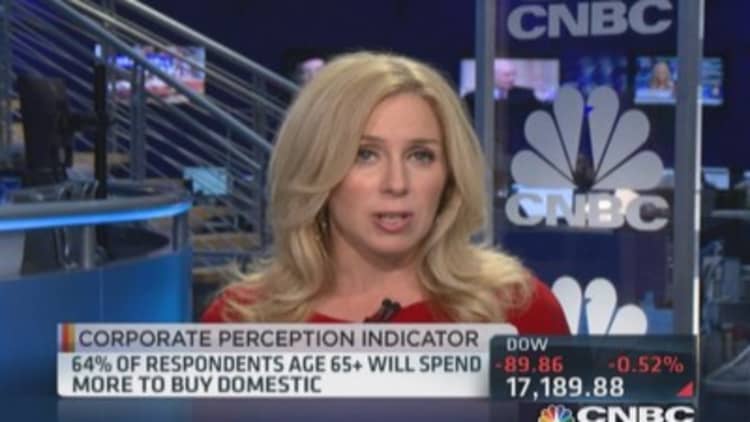
A new survey shows that young people are less likely than other Americans to spend more in order to buy U.S.-made products. But some groups are trying to change that.
Only 43 percent of American consumers ages 18-34 said they would spend more money to purchase domestically made goods, while 64 percent of those older than 65 said they would, according to a survey carried out for CNBC and Burson-Marsteller by market research firm Penn Schoen Berland.
And while some of the difference between generations' willingness to spend correlates with how much they have in the bank, there is also some concern among proponents of domestic buying that the demographic trend will persist.
Don Rongione, president and CEO of American Made Matters, which tries to promote consumption of U.S.-made products, said that his organization is focusing on emphasizing not only the advantages of a strong U.S. manufacturing sector, but also the stringent environmental and labor regulations the U.S. has relative to most emerging nations.
Read MoreWhy Americans still put their faith in Main Street
And, he said, younger generations of Americans are buying the argument, despite the financial constraints.
"Younger people who are just starting out—it's more of a financial burden for them [to buy American products]. But I think those that are more socially aware are more willing to do so," Rongione said.
One such individual is 31-year-old Sarah Mazzone, who runs the Made in USA Challenge blog. A nurse from Philadelphia who works three jobs, Mazzone catalogs her quest to only buy domestically made products whenever possible, despite the added cost.
Read MoreMore businesses exporting 'Made in USA' again
"It sounds super cheesy, but it really has changed my life. It's made me more frugal and really made me appreciate things more. And it's been a great thing for my children to grow up around," she said of her project, which seeks to help others adopt similar purchasing habits. "The more that people understand how they can do that, and why they should be doing it, the bigger the movement gets."
Mazzone said that buying Made in USA is "something that everyone who is an American can agree on."
Read MoreWorld agrees on a few things
Mark Andol, founder of the Made in America Store, a merchant that sells more than 6,500 domestically made products, said that education on the topic is essential to helping the country. Andol features prominently in "American Made Movie," a film that will be shown in some schools.
"Once they get educated, that young person will really understand the importance of buying here," he said. "It's not just buying a product. From packaging to shipping, there are many people who are helped by buying American."
But the push for patriotic purchasing is not a protectionist impulse, Andol said. "There's no problem with globalization, but we're way out of balance," he said.
Read MoreWelcome Home, 'Made in U.S.A.' on the Rise
Some companies are moving toward domestic manufacturing on their own. Last week, Maine Gov. Paul LePage announced that Lincoln Logs—the popular children's toy—will begin manufacturing in his state after a stint in China.
Pennsylvania-based K'NEX—which currently holds the Lincoln Logs license—is a member of American Made Matters.





